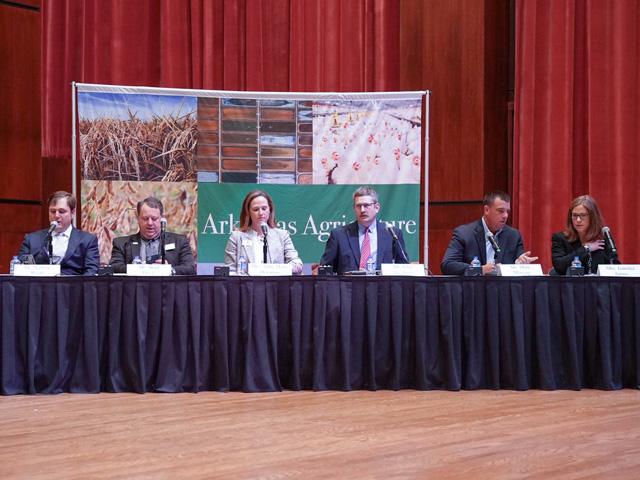DTN Ag Policy Blog
Senate Ag Arkansas Hearing Looks at Challenges Facing Rice Growers
WASHINGTON, (DTN) -- A Senate Agriculture Committee field hearing in Jonesboro, Ark., on Friday highlighted problems in the rice industry while other commodity representatives and farm bill stakeholders asked for more money when the next bill is written.
Senate Agriculture Committee Chairwoman Debbie Stabenow, D-Mich., noted in an opening statement that Arkansas and Michigan "have about the same number of farms, our farm economies are roughly the same size, our states are both leaders in innovative mass timber construction, and our farmers are passionate about conserving habitat for ducks and other wildlife because both of our states have booming outdoor recreation economies."
But she added that she wanted to hear more about what rice and cotton farmers are seeing on the ground.
Stabenow also said she and Sen. John Boozman, R-Ark., the ranking member on the committee, would put "civility at the center of everything" in the farm bill debate.
Boozman noted that Arkansas has 42,000 family farmers and ranchers operating on 14 million acres, with gross receipts from the sales of crops and livestock equal to $9.7 billion.
The economic output of food and agriculture in the state is $92 billion, which supports nearly 500,000 jobs and $23 billion in wages, Boozman said, noting that Arkansas is the country's top producer of rice, a major producer of cotton, poultry and timber with soybeans the most widely planted crop and an increase in peanut acreage due to a state-of-the-art peanut shelling plant in Jonesboro.
But he added, "And even with all this success, 53 of Arkansas' 75 counties lost population in the last census, something that is far too common in rural counties throughout the U.S. We all lose when rural America loses.
"To stem this loss, we must ensure our farm families and rural residents have access to affordable electricity, high speed internet and safe drinking water. Those forms of infrastructure are essential services and with proper investment rural communities can measurably increase their quality of life."
Jennifer James, the chair of the USA Rice Sustainability Committee from Newport, Ark., said it is important to recognize that the baseline in the 2018 farm bill was not big enough to deal with the needs that were handled through ad hoc disaster assistance.
"Accordingly, we would ask that you would pursue an additional baseline investment in these policies so that they can meet the needs of today and whatever new challenges may arise in 2023 and beyond," James said.
P[L1] D[0x0] M[300x250] OOP[F] ADUNIT[] T[]
The Title I loan rates "no longer provide the level of assistance needed for an effective safety net for our nation's rice producers," she said, adding that USA Rice is "looking into ways the reference prices could be indexed to input costs to provide more relevant protection to the farm families that put their capital at risk each year to produce the crop."
She also noted that while rice has seen steep increases in fertilizer, fuel, machinery, crop protection, and labor costs, "we have not seen a corresponding increase in the value of our crop."
Nathan Reed, chairman of American Cotton Producers in Marianna, Ark., said "As Congress plans the path forward for the 2023 farm bill, additional funding is necessary to address the challenges both on the farm and throughout the supply chain."
He added, "While we recognize the budgetary constraints, we believe the committee should review options to include either a permanent disaster assistance program in the upcoming farm bill or seek policy options to help further minimize the deductible producers are left to cover with most existing, affordable crop insurance products."
Brad Doyle, president of the American Soybean Association from Weiner, Ark., said, "it is difficult to see how the current budget baseline will provide for needs in the next farm bill."
Doyle said ASA asks that the committee consider increasing the soybean reference price for loan programs and providing the option but not the requirement to update base acres.
The Growing Climate Solutions Act, which arose out of this committee and passed the Senate with overwhelming bipartisan support, should be included in the farm bill if not enacted by that time, Doyle said.
Elizabeth Bowles, CEO of Aristotle Unified Communications, LLC, in Little Rock, Ark., said that, while fiber is the gold standard in providing high speed internet service, "rural communities do not have years to wait for broadband connectivity, nor will $65 billion be sufficient to cover the cost of a fully fiber-to-the-home deployment everywhere in rural America, especially as we see the cost of all construction materials increase dramatically due to inflation."
"For these reasons, it is important that the farm bill broadband programs remain truly technologically neutral, both explicitly and by not using proxies -- such as the requirement of 5 symmetrical 100 Mbps upload and download speeds -- whereby only a single technology can meet the required standard."
She added that the farm bill should recommend that the Agriculture Department consult with the Federal Communications Commission to ensure accuracy of their fabric -- a "whole of government" approach.
To deal with inconsistencies about the definition of rural for federal programs, she added that the definition, at least for broadband, should be "a county with an average population density of less than 500 persons per square mile, excluding the county seat."
Rhonda Sanders, CEO of the Arkansas Food Bank said the farm bill should lead to the purchase of more food for commodity distribution and expand access to the Supplemental Nutrition Assistance Program.
- Senate Agriculture Committee -- 2023 Farm Bill: Perspectives from the Natural State (video) https://www.agriculture.senate.gov/…
Jerry Hagstrom can be reached at jhagstrom@nationaljournal.com
Follow him on Twitter @hagstromreport
(c) Copyright 2022 DTN, LLC. All rights reserved.




